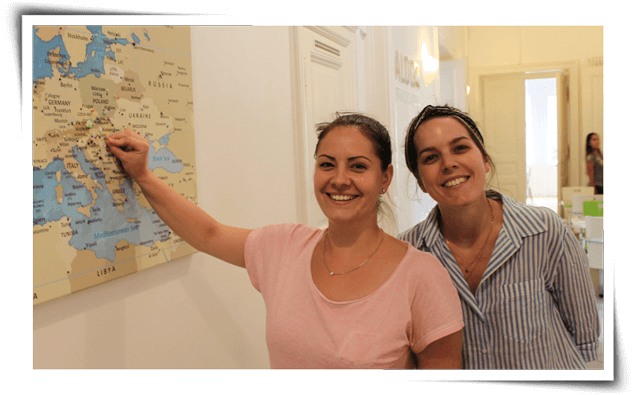How much is a German course on the
level A1 at DIALOG in Vienna?
| Price* | Course description |
|---|---|
| € 349 1 month |
Offer for Newcomers: German A1.1Intensive course on the level A1.1 incl. 1 DIALOG workshop |
| € 748 2 months |
Offer for Newcomers: German A1.1 & A1.2 (A1)Intensive courses on the the level A1.1 & A1.2 incl. 1 DIALOG workshop. |
| € 399 1 month |
Regular Price: German A1.1Intensive course on the level A1.1 |
| € 798,00 2 months |
Regular price: German A1.1 & A1.2 (A1)Intensive courses on the level A1.1 & A1.2 |
*Prices include extra material and copies. Course books are not included. Optionally available at DIALOG: € 29.
Next Course dates
German courses on the level A1 take place all year round.


Course times
Monday, Tuesday, Wednesday, Thursday
- 09:00 – 11:45
- 12:15 – 15:00
- 15:30– 18:15
We offer one time a level each month. If you want to receive more information on exact times this month please contact office@dialog-wien.at. We are looking forward to your mail.
What will you learn in a German course on the level A1?
Here is your course content.
Requirements:
- German course A1.1 – no (or very limited) German knowledge
- German course A1.2 – basic German knowledge (A1.1)
On the level A1 your language competence will be continuously built up in the skills listening, speaking, reading and writing by our experienced German trainers in small groups with a maximum of 5-10 participants. You learn daily-used phrases, simple sentences and you are able to give and ask for basic information.
The basis for advanced grammar on higher levels is set and practised in our courses on the level A1. After you finish the courses on the level A1 you can talk about your daily life, personal information and familiar topics, when the conversation speed is slow and the diction of your conversation partner is simple and clearly articulated.
Further information:
Course material: Momente A1 volume 1 (A1.1) | Momente A1 volume 2 (A1.2)
Language levels according to CEFR: German A1 | Levels: A1.1 und A1.2
Test preparation upon request: ÖSD A1 Grundstufe Deutsch 1 | telc A1 | ÖIF A1 – Fit für Österreich
A1.1 – 1 month | A1.2 – 1 month
Finish one level in only one month!
German Course A1.1
Everything you need to know!
In the first half of the German course A1 (A1.1) you start at the base, which means you need no previous knowledge whatsoever. Our native speakers explain as much as possible (almost 100%) in German from the start. This might sound and be difficult in the beginning, but it it of the utmost importance that you start thinking or trying to think in German and not translating back and forth between your mother tongue and German, if you want to have an effective learning experience and success.
DIALOG will help you train the following basic skills (according to CEFR):
- listening
- speaking
- reading
- writing
Your German knowledge after the course A1.1 is:
You learn to introduce yourself in German
The course starts with the most important part of getting to know another: the introduction. Participants learn to introduce themselves and ask information from other people.
- greetings (hello and goodbye)
- condition or feeling (how are you?)
- origin / countries
- job
- family status
- family
- languages
The A1.1 basics
Accompanying the topic “introduction” we work on your basic German skills. These include:
- alphabet
- pronunciation
- diphthongs
- umlauts
- emphasis and stressing words/letters
- numbers (1 – 1 million)
Further topics
The further topics in A1.1 are focused on your daily life and centered around familiar things and situations.They include amongst others the following:
- furniture
- adjectives
- colours and objects
- materials and shapes
- prices
- hobbies
- office and computer
- food and drink
- celebrations
- traffic and travelling
- daily actions/routines
We also work on and with indications as well as prepositions regarding time such as times during the day, week days, seasons, months and the time.
This vocabulary is learned and practised using reading, writing, listening and speaking skills. Role play and active speaking exercises are an integral part of vocabulary training already at the level A1.1.
Grammar on the level A1.1
Basics: Especially in the beginning of learning a foreign language it is important to understand the grammar correctly. This is why grammar is a vital part of the A1.1 course. Our goal is to impart the German grammar in a structured, comprehensible way with many applicable, real-life examples.
*NOM = nominative | ACC = accusative
| Grammar topic on the level A1.1* | |
|---|---|
| conjugating verbs in the present tense | positions of a verb in a sentence |
| negation using nicht and kein- (NOM and ACC) | questions (starting with a w or answered with yes/no) |
| possessive determiner in NOM and ACC | definite and indefinite article in NOM and ACC |
| personal pronouns in NOM and ACC | seperable verbs in the present tense |
| modal verb can in the present tense | sentence bracket |
Grammar does not mean to learn something by heart and then practising it in written form for hours on end. The more understandable and real-life applicable grammar is explained, the easier it will be processed and understood. Since in our experience learners often have most trouble with using grammar in its spoken form, we support them in doing so from the beginning using oral exercises and activities surrounding the discussed grammar.
German Course A1.2
All you need to know !
To participate in the second part of our A1 German course (A1.2) you should already have some basic knowledge in German; you will train your listening, speaking, reading and writing skills.
On the level A1.2 the vocabulary will move further from your daily life and the participants will work with situations they will not encounter on a daily basis, but which are important for a successful communication e.g. travelling.
Your german knowledge after the German course A1.2 will be:
Topics I A1.2: Out and about
- places in the city
- describing the way
- rent advertisements
- in the hotel
- weather
- traffic and the environment
- cardinal directions
- celebrations and parties
- institutions
Topics II A1.2: Daily life
Your vocabulary concerning your person and your daily life will also be expanded.
- habitation
- body
- looks
- charakter
- activities at home
- clothes
Useful phrases
While building onto your vocabulary you will of course also get to know a lot of important and useful phrases, which are needed for certain situations on an elementary level. This situations include:
- describing
- assessing
- saying that you are sorry
- asking for or demanding something
- talking about plans in the future
- wishing for something
- giving advice
- having a discussion
- congratulating
Grammar in the German Course A1.2
In this course grammar topics which are already known from A1.1 are extended. For example, the personal pronouns are learned in a new case or the basic perfection is extended to the inseparable verbs. But also for new topics like the ordinal numbers, the comparative or the subjunctive II the basis is laid in A1.2, so that these can be deepened and extended in the German course A2.1.
*NOM = nominative | ACC = accusative | DAT = dative
Grammar topics at level A1.2*
| local prepositions and the dative | verbs with dative |
| personal pronouns in DAT and ACC | Genitive-s for proper names |
| temporal prepositions vor/nach/in/für | verbs with dative |
| temporale Präpositionen vor/nach/in/für | prepositions mit/ohne |
| modal verbs wollen/dürfen/müssen/sollen | imperative |
| preterite (past tense) of haben and sein (being and having) | perfect (past tense) of inseparable verbs |
| comparative and comparisons | conjunction denn |
| conjunctive II with würden (would) | ordinals |
Grammar is made understandable with practical examples and is trained and consolidated through written and oral exercises and activities. It is particularly important for us to test and practice the oral applicability, as experience has shown that this is most difficult for learners.
Language levels
Language levels of our German courses according to CEFR:
- Further information on German Course A2
- Further information on German Course B1
- Further information on German Cours B2
- Further information on German Course C1
- Further information on German Course C2
German Course A1.1 or A1.2?
Which of the two parts is right for you can easily be determined with our DIALOG placement test.



